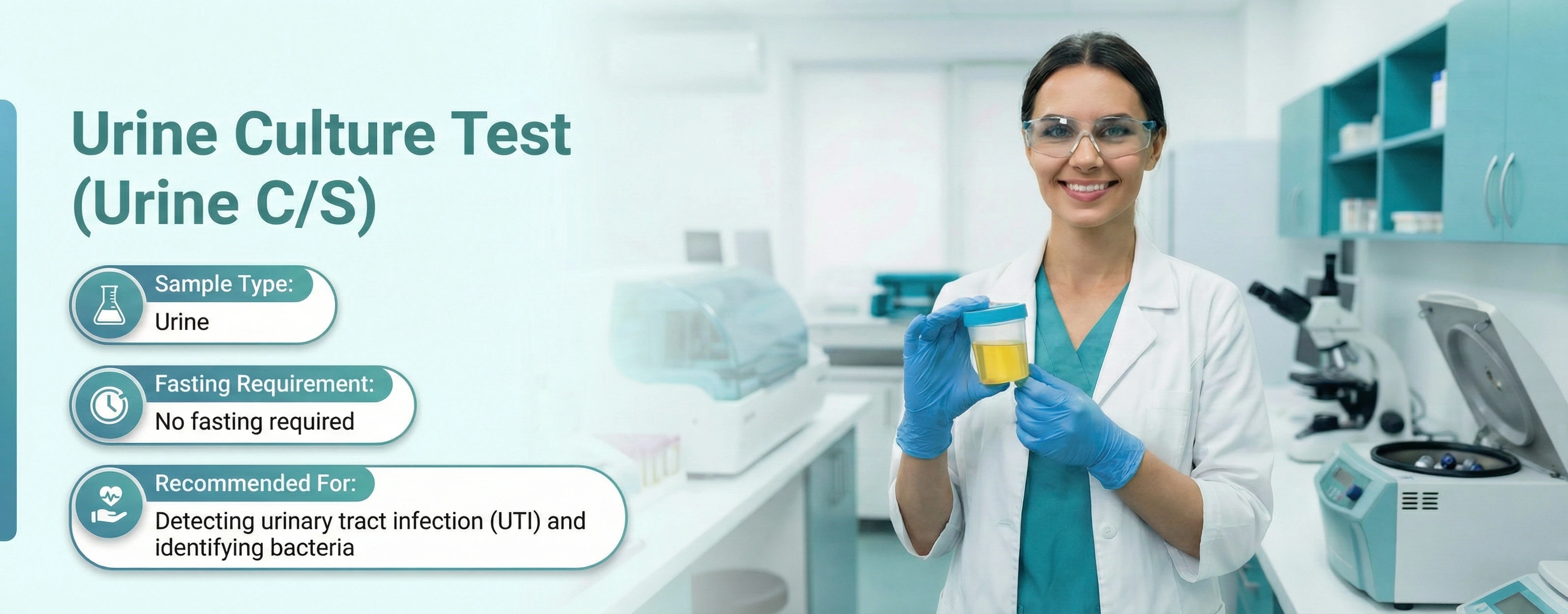1550+ orders placed in your location
100% NABL & ISO Certified Lab • 100% Accurate Reports
Urine Culture Test (Urine C/S)
Urine C&S, Urine Culture and Sensitivity
- SummaryUrine Culture Test is used to detect infection causing microbes present in the urinary tract. It helps to find the cause of urinary tract infections (UTIs) and determine the which helps the doctors to chosse the specific antibiotic. It involves collecting a urine sample, preferably the first morning sample and no fasting is required for it. Read more
- Reports Within87 HrsView Sample Report100% NABL & ISO Certified Labs
- SampleUrine
- AgeAll Age Group
- GenderMale and Female
- FastingNot Required
PharmEasy Promises
Know More About The Test
A quick info on Urine Culture test
Overview
Germs like bacteria that arise in the urine can cause infections like urinary tract infections. The urinary tract includes the bladder, kidneys, urethra and ureters. In most cases, an infection starts in the urethra or bladder. But it can affect any part of the system.
Products called metabolites are present in the blood and get created by metabolic processes. Some of these products get utilised by the cells, while others get filtered out of the blood. The urine produced by the kidneys passes through the ureters. It travels to the urinary bladder, where it gets stored until the bladder is full.
The bladder then releases urine through another tube called the urethra. The route that urine follows from the kidneys to the outside is known as the urinary tract. A Urine culture test checks the presence of any bacteria in your urine.
Urinary tract infections are more common in women than in men. The reason is that the female urethra is shorter and comparatively closer to the anus. So, it allows the bacteria to come in contact with the urethra more easily.
Symptoms like a burning feeling or pain when you pee call for a urine culture test. This test can also get prescribed by doctors to individuals who often need to pee but cannot. Other symptoms that call for a urine culture test include belly ache, fever and smelly urine.
When it comes to India, results show that the prevalence of UTIs in females and males are almost equal. Women in the age group of 21-30 complain about urinary tract problems the most.
Older men in India tend to suffer from UTIs a lot. This high incidence in men above the age of 60 is closely linked to prostate conditions and diabetes.
The UTI incidence in both women and men rises after the age of 85. In the 0-10 age group, 35.44% of males and 37% of females were found culturally positive.
Sample Type
The results of a urine culture test are based on a urine sample. A unique kit is usually used to collect urine samples.
Risk Assessment
Urinary Tract Infection, Bacteria Causing Urinary Infection
What does this test detect?
The urine culture test measures if an individual has a urinary tract infection or any other bacterial infection.
Indications for Urine Culture Test
A doctor usually prescribes a urine culture test to individuals with the following symptoms:
- Pain or burning while peeing
- Smelly urine
- Bellyache
- Limited urine secretion
- Fever
- Abdominal pain
- Constant chills
Following the diagnosis, once the treatment gets initiated by the doctor, another urine culture test may be prescribed after three to six months.
The second Urine Culture Test results will decide if the doctor continues the treatment or alters it.
The urine culture test is applicable for men, women and children alike. The urine culture test also gets prescribed to three months pregnant to check for potential urinary tract infection.
Some bacteria that commonly cause UTIs are:
- Klebsiella
- Acinetobacter
- Enterobacter
- Proteus
How frequently should you take this test?
A random urine culture test helps with the diagnosis of urinary tract infections. The results of the test usually come in 1-5 days. If there are no harmful germs in your urine, the results will show negative. However, if harmful germs are growing in your body, then the results will show positive. This likely means you have a urinary tract infection.
Your doctor will prescribe antibiotics that you’ll have to consume regularly. If the symptoms persist, your doctor may prescribe a urine culture test. It is usually to be taken within 3-6 months.
Test Preparation
What to Expect During Urine Culture Test
Before the Test:
The Urine Culture test doesn't generally require fasting. But if specific instructions given by your healthcare provider regarding food, drink, or medication restrictions pertaining to another blood test scheduled for the same time, kindly follow them. Before the test, you will be provided with a sample collection kit. Usually the first urine of the morning is collected as a sample. If the test doesn't require morning urine, you should drink water for a few hours before the test.
During the test
If you are doing the sample collection at home, here are the steps generally involved:
- Clean your genital area thoroughly before the test to avoid contamination of the sample.
- Wash your hands and unseal the collection kit.
- Start urinating, and once you are midstream, collect the urine in the container. Avoiding the initial and final parts of the stream are advisable.
- Securely cap the container without touching the inside.
- Wash your hands again.
- Label the collection jar with your details if not pre-labeled.
After the Test:
- Store the collection jar with the sample in a cool and dry place away from sunlight which can degrade the sample.
- Hand the sample over to the healthcare professional sent by your online test provider.
Parameters
The parameters in a urine culture test include colonies/ml. A CFU or colony-forming unit is a unit that is commonly used to estimate the concentration of microorganisms (bacteria) in a urine culture test.
The ranges in the test’s results depict if an individual has a urinary tract infection or not. The result of a urine culture test gets concluded as positive or negative. If the colonies/ml are above the normal range of 10,000-1,00,000 colonies/ml, the individual has a positive urine culture. On the contrary, if the range is between 10,000-1,00,000 or below 10,000 colonies/ml, the result is negative. The antibiotic sensitivity or susceptibility test helps to select an appropriate antibiotic that is effective against specific types of bacteria or fungi causing any infection. This test needs to be conducted as some types of bacteria or fungi are resistant to certain antibiotics and infections and they are not cured by treatment with those antibiotics.
In order to understand what the results mean absolutely, you must talk to your healthcare provider.
Ranges
|
Range |
Result |
|---|---|
|
10,000 > |
Negative |
|
10,000-1,00,000 colonies/ ml |
Normal |
|
> 1,00,000 colonies / ml |
Positive |
The normal values and reference ranges of the test may vary from lab to lab. Please refer to the ranges mentioned in the report and consult a doctor to understand the interpretation of lab reports.
Urine is normally sterile. But some contamination from skin bacteria is frequent while collecting urine. So, colonies of bacteria/ml between the range of 10,000 and 1,00,000 are considered normal. However, if the range exceeds 1,00,000 colonies/ml, an individual most likely has a urinary tract infection.
A negative result of the Urine Culture Test shows that no germs or bacteria were found in the urinary tract. On the other hand, a positive or abnormal result means that some organisms (bacteria) are growing in the urinary tract.
Test Result Interpretation
The main component of a Urine Culture Test is colonies of bacteria/ml. So, if the colonies are higher than the normal range, it could point towards a urinary tract infection. The results are interpreted as concerning if the symptoms of urinary tract infection are present. That is why sometimes, even if the colonies/ml are within the normal range, an individual might still have an infection.
Results of a Urine Culture Test are often interpreted jointly with that of a urinalysis. For instance, nitrite (a marker for bacteria) or leukocyte esterase (a marker of white blood cells) helps corroborate a urinary tract infection.
Price/Cost
Typically, a Urine Culture test is priced in the range of INR 649 to INR 1249. However, the price can vary based on the city and the laboratory chosen. To provide a more detailed overview, here are the average costs of Urine Culture test in several major Indian cities:
City | Min Price | Average Price | Max Price |
649 | 949 | 1249 | |
649 | 949 | 1249 | |
649 | 949 | 1249 | |
649 | 949 | 1249 | |
649 | 949 | 1249 | |
649 | 949 | 1249 | |
649 | 949 | 1249 | |
649 | 949 | 1249 | |
649 | 949 | 1249 | |
649 | 949 | 1249 |
Risks and Limitations
The Urine Culture test is a frequently performed diagnostic examination it typically does not carry the risk of complications. It is not an invasive test and simply requires the individual to gather a sample.
Limitations of the test
- Mistakes caused by faulty equipment or contamination.
- Possibility of incorrectly understanding some markers, leading to a wrong diagnosis and report
Was This Test Information Helpful?
Please rate your experience
References
People Also Ask
What is a positive urine culture?
What diseases can urine culture detect?
What is a normal urine culture report?
Can urine culture detect kidney infection?
What infections can be found in urine?
Have any doubts? Ask us.
Ask us anything about the Urine Culture Test (Urine C/S) to understand it better
We provide trusted, expert-curated health content to support better awareness,prevention, and care.
Backed by experienced doctors, medical experts, and strict editorial standards.


